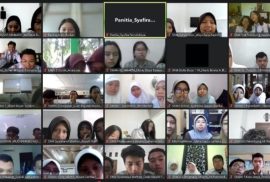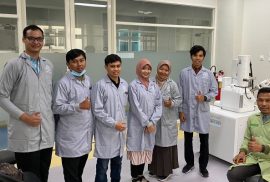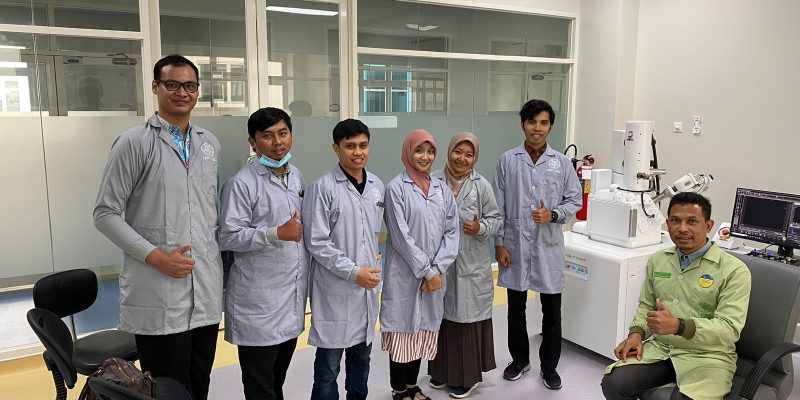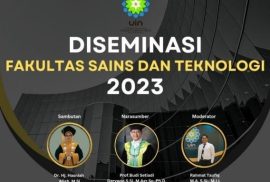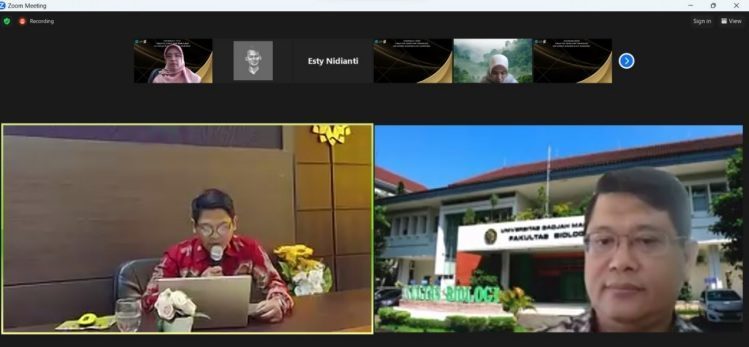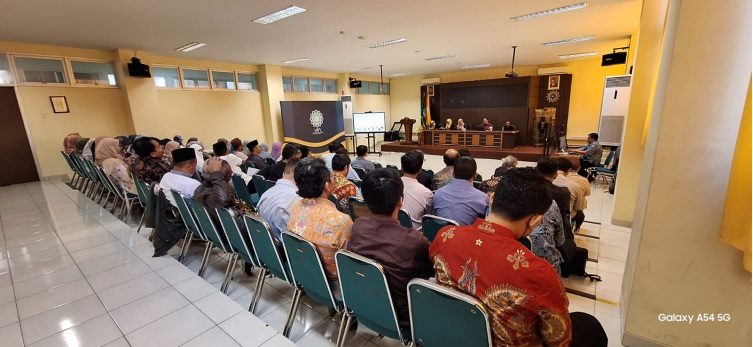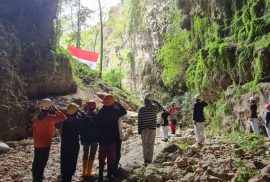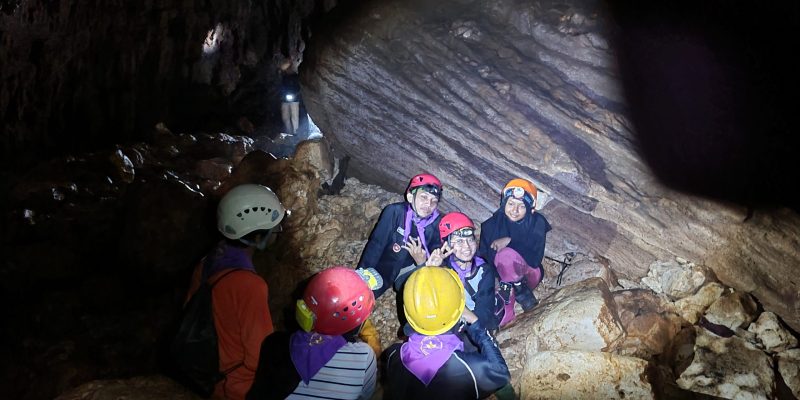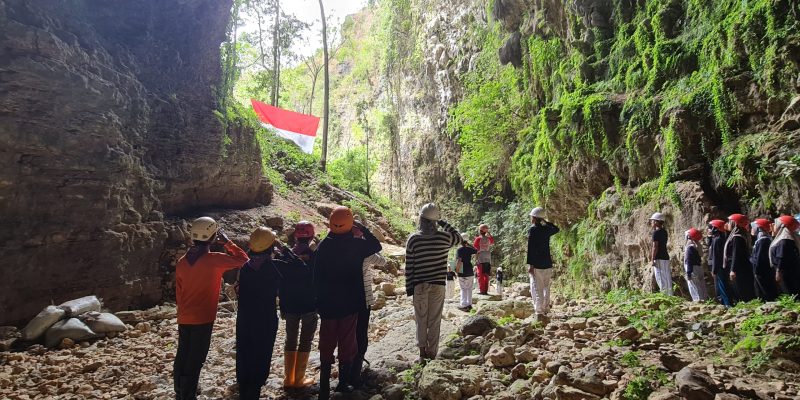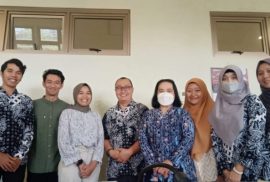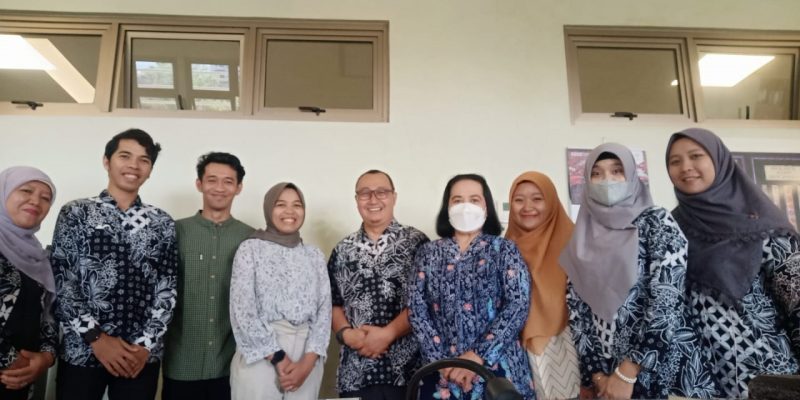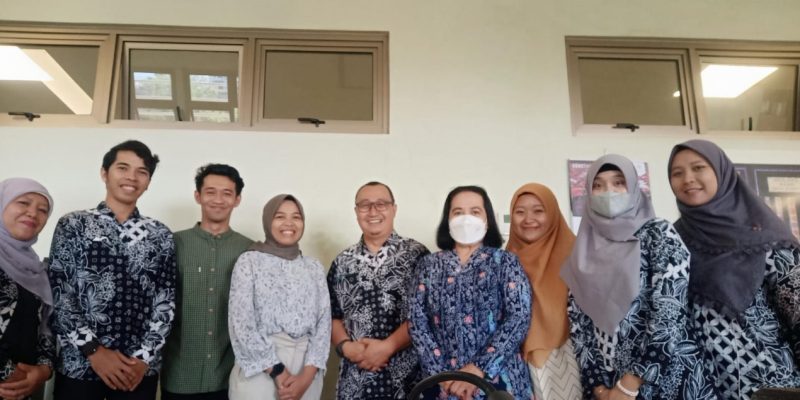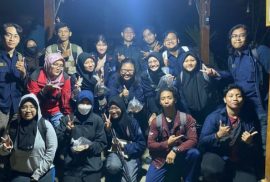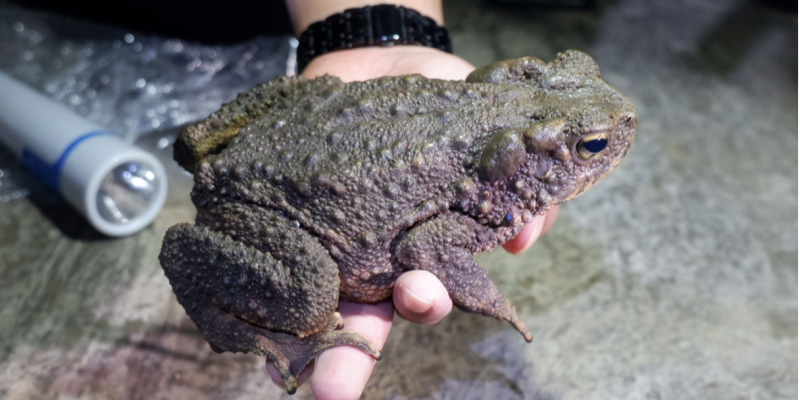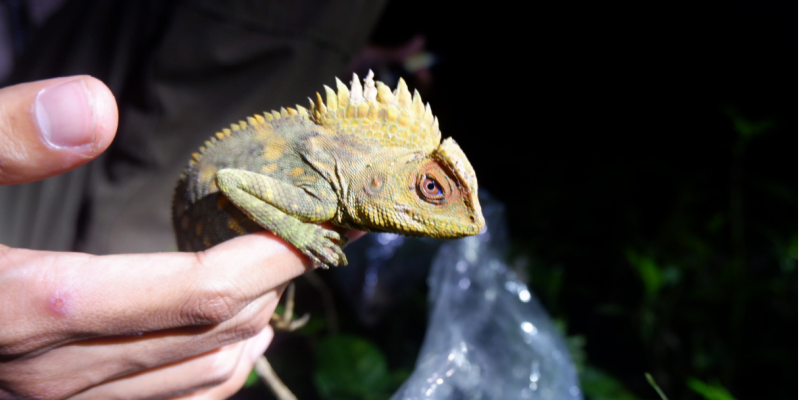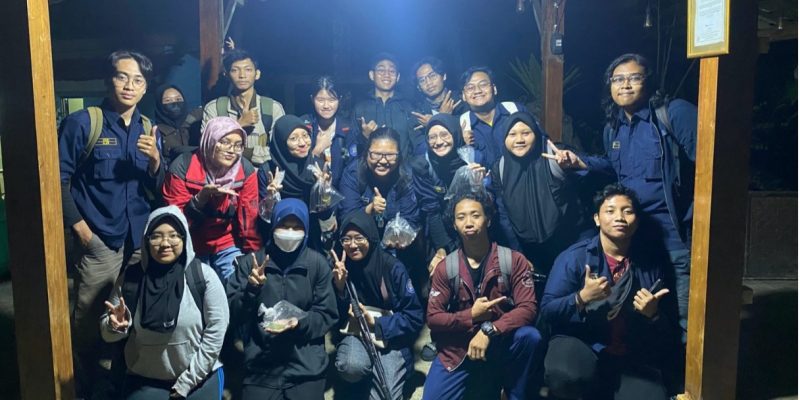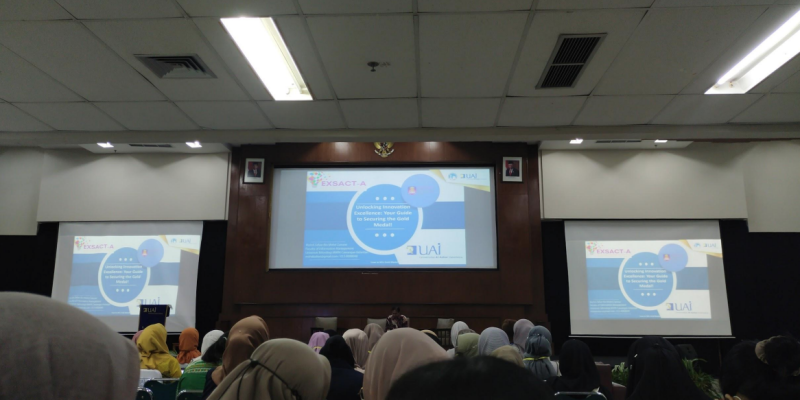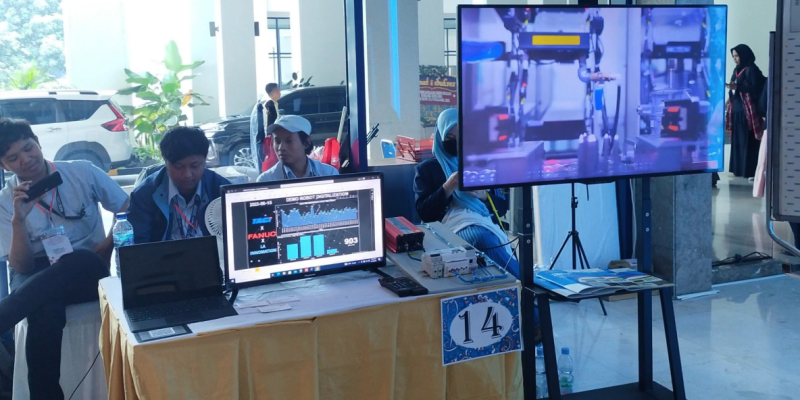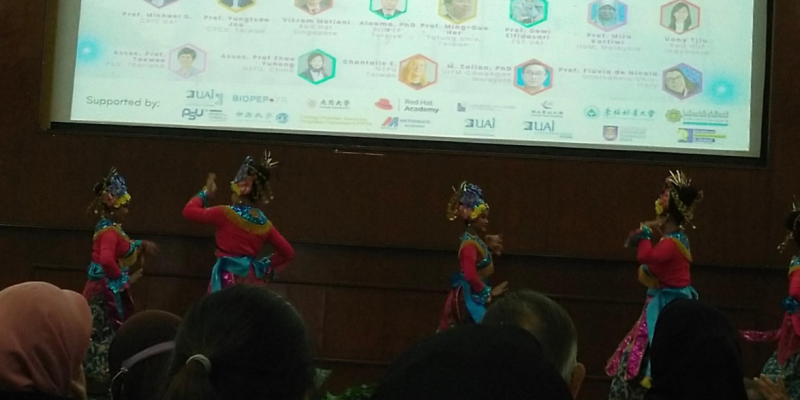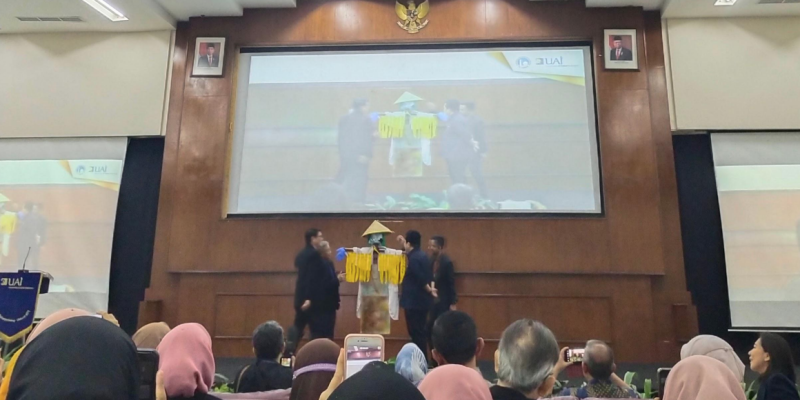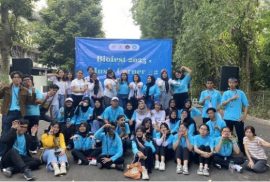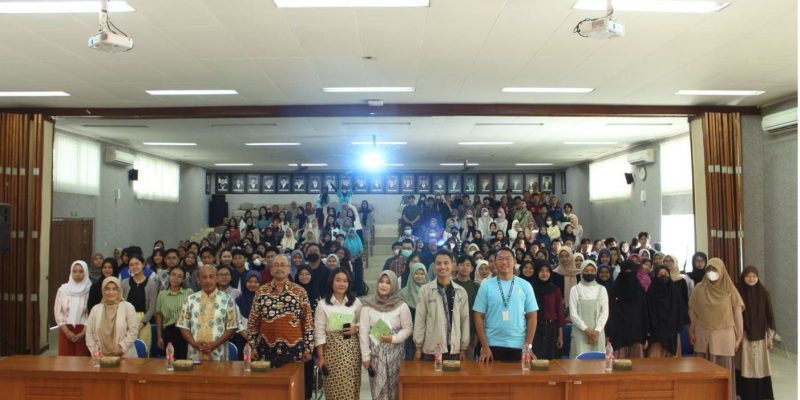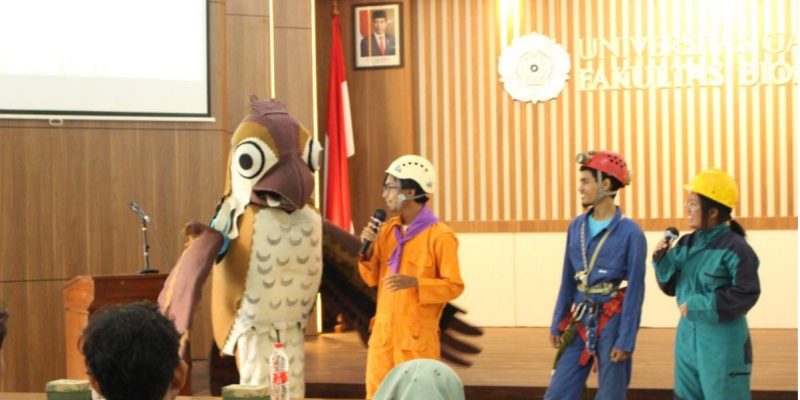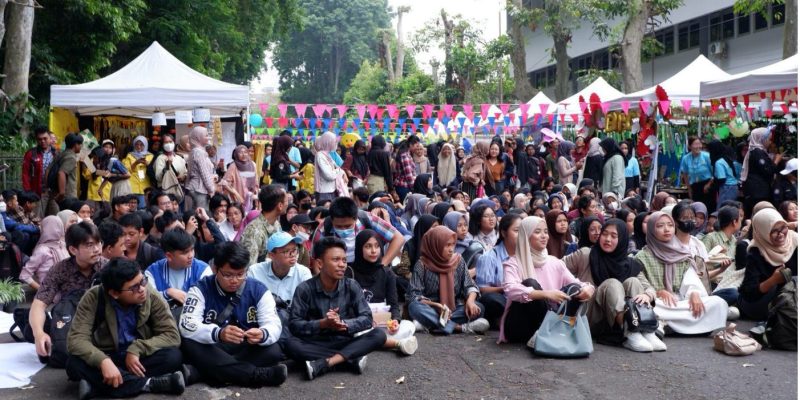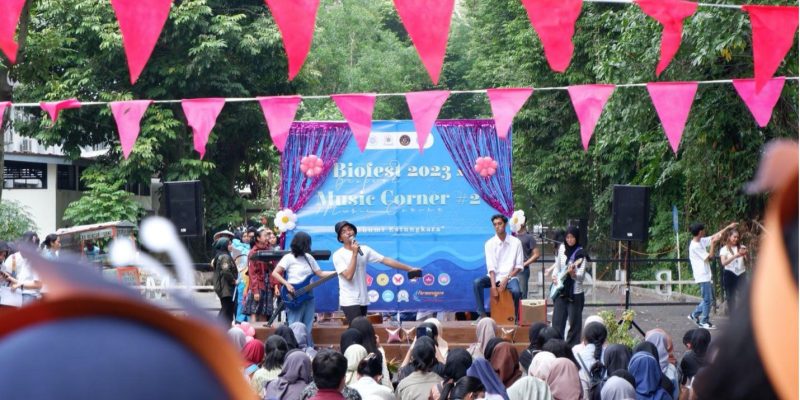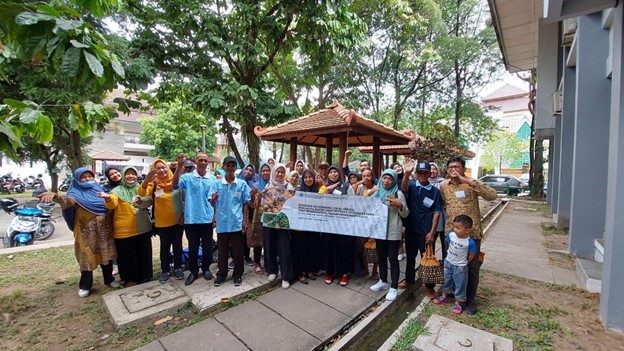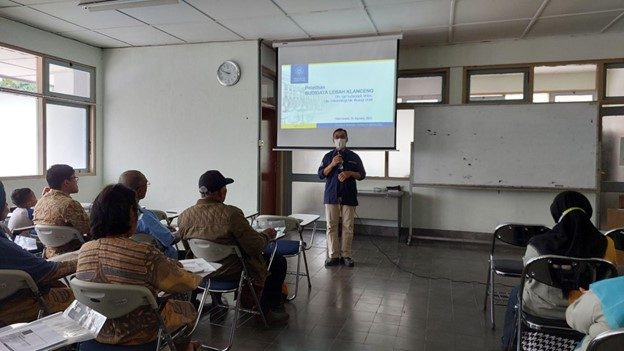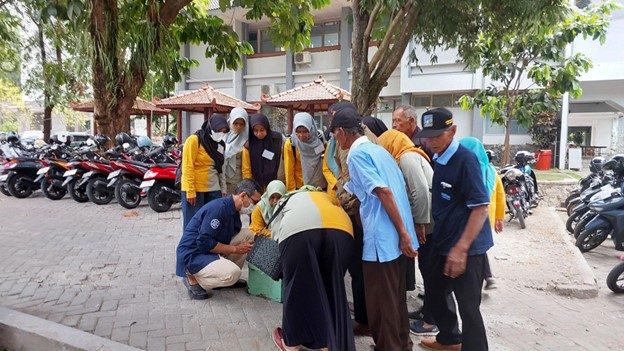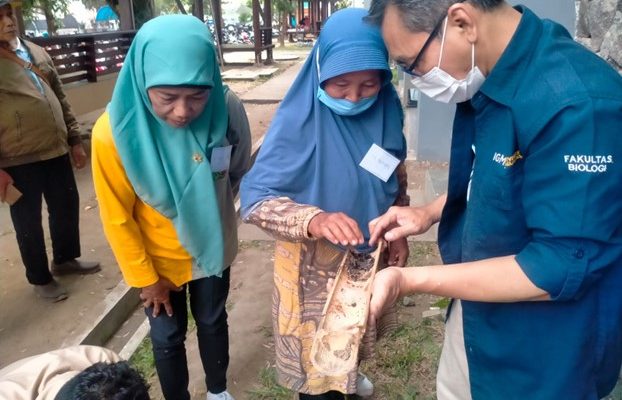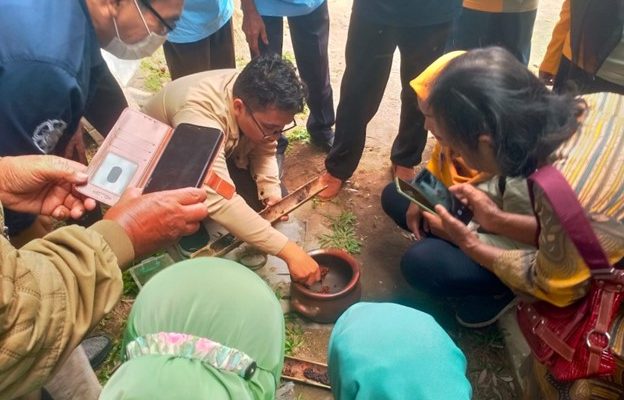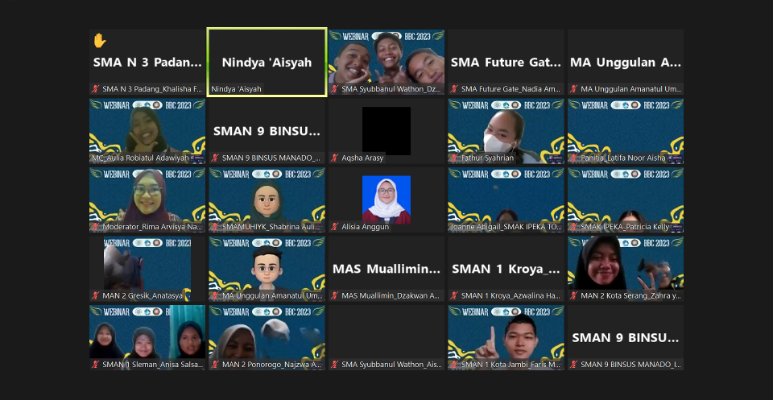
Arsip:
News Release
On Saturday, September 2 2023, the Opening and Webinar for the Biology Brainiac Competition 2023 took place with the theme “Unleash The Power of Coral Reefs to Fight Against Strong Waves,” organized by the Biosphere#6 Committee via Zoom Meeting, with 117 participants. The event featured introduction of the Faculty of Biology by Zuliyati Rokhmah, S.Si., M.Si., Ph.D., a lecturer from the Faculty of Biology, and insights into coursework at the Faculty of Biology by Nareta Defiani, S.Si., a 2018 alumnus of the Faculty of Biology UGM. The event was moderated by Rima Arvisya, a student from the Faculty of Biology. The purpose of this event was to provide Biology Brainiac Competition participants with an overview of the Faculty of Biology UGM and to officially open the Biology Brainiac Competition.
The Biology Brainiac Competition Webinar began with an introduction by the moderator, followed by speeches from Daffa Patria Putra Dewanto, the Chairperson of the Biosphere#6 Event, Fathur Syahrian Ramadhani, the Chairperson of the Biology Student Executive Board (BEM), and Dr. Bambang Retnoaji, M. Sc, the Vice Dean for Academic Affairs and Student Affairs. The next session involved presentations. In the first session, Zuliyati Rokhmah, S.Si., M.Si., Ph.D., covered topics related to the Faculty of Biology, including its facilities, admission procedures, student organizations/institutions within the Faculty of Biology, and the academic activities at the faculty. This was followed by a discussion session. In the second session, Nareta Defiani, S.Si., discussed topics such as coursework, career prospects for biology graduates, and her experiences during her studies at the Faculty of Biology. This session was also followed by a discussion session.
The event concluded with the Biosphere#6 Committee providing information about the Biology Brainiac Competition rules and regulations, followed by a documentation session and closing remarks by the moderator.
On Sunday, September 3, 2023, the Preliminary Round of the Biology Brainiac Competition was held by the Biosphere#6 Committee via Zoom Meeting, with a total of 123 teams participating. This preliminary round is part of the Biology Brainiac Competition event, which will ultimately lead participants to the Final Round. During this preliminary round, Olympiad participants answered 100 multiple-choice questions online via a Google form. The activity commenced at 07:30 AM (WIB) for opening the Zoom meeting and taking attendance. Prior to the start, the committee explained the question-solving process to avoid any issues. Subsequently, the participants began answering the questions from 08:00 AM to 11:00 AM (WIB).
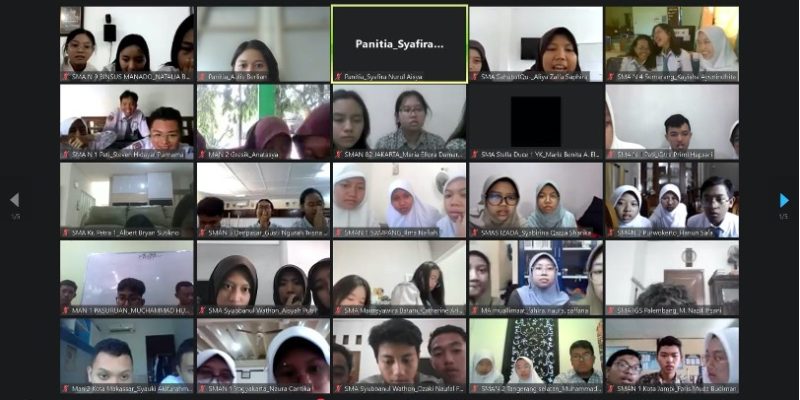
Throughout the question-solving session, all participants were required to keep their cameras activated from the beginning to the end to ensure oversight and prevent cheating. The preliminary round of the Biology Brainiac Competition concluded with a documentation session and a closing statement. From this preliminary round, the top teams will be selected to advance to the semifinal stage. A total of 20 teams will have the opportunity to progress to the semifinals.
The hope behind organizing the Biology Brainiac Competition is to serve as an initial stepping stone for all students to advance in their educational journey and continuously optimize their potential by remaining active and achieving excellence.
One of the widely-used research tools in current scientific research activities is the utilization of electron particles. The observation of electron particles through a microscope instrument provides valuable information and data regarding the ultrastructure of the observed samples, including surface topography, composition, and even elemental composition mapping. To keep up with the advancements, deepen their knowledge, and apply this instrument effectively, three members of the Plant Development Structure Laboratory staff, namely Utaminingsih, S.Si., M.Sc., Novita Yustinadiar, S.Si., M.Si., and Dr. Wiko Arif Wibowo, S.Si., participated in a training program organized by LPPT (Laboratory for Research and Integrated Testing) UGM. The FE-SEM (Field Emission-Scanning Electron Microscopy) training took place on August 31st to September 1st, 2023, at the FE-SEM Laboratory section of LPPT UGM.
The training activities were divided into theory sessions delivered by Prof. Dr. Eng. Yusril Yusuf, S.Si., M.Si., M.Eng. and Yusuf Umardani, S.T., M.Eng., as well as practical sessions supervised by Yusuf Umardani, S.T., M.Eng., and Virginia Fahriza, S.Si. The theoretical discussions covered fundamental concepts of FE-SEM, distinctions from SEM, SEM+EDX test result analysis and mapping, as well as techniques for capturing high-quality images.
This training event was held in a hybrid format with a total of 34 participants from various institutions across Indonesia.The material presented during the training provided a deeper understanding and insight into the use of SEM instruments in biological research, including its current developments that utilize probe current for electron particle emission in FE-SEM. Interactive discussions revolved around the preparation of biological samples required before observation. This is because biological samples typically contain a significant amount of liquids, whereas SEM observations ideally require samples to be in a dry state. Consequently, specific preparation and techniques are needed, depending on the type of biological sample being used. “This training has been highly beneficial in enhancing our analytical knowledge of anatomical structures, and we hope it will ultimately improve the quality of research and education in the SPT laboratory,” said Wiko in response to the training activities.
The use of electron microscopes in biological research has been widely adopted and has aided in the structural analysis of various fields of biology, not only in botany but also in zoology, microbiology, ecology, and environmental sciences, as well as in biomedical research, forensic biology, biodiversity studies, and more. Sample analysis services for observations using FE-SEM are currently available at LPPT UGM and SEM at FKG UGM.
On Friday, September 1, 2023, Prof. Dr. Budi Setiadi Daryono, S.Si., M.Agr.Sc., Ph.D., the Dean of the Faculty Biology UGM, had the opportunity to be a speaker at the Research Dissemination event organized by the Faculty of Science and Technology (FST) UIN Sunan Gunung Djati, Bandung, in a hybrid format, combining online sessions via Zoom and in-person sessions at the FST Auditorium. The event consisted of two sessions, a seminar from 09:00 AM to 12:00 PM WIB and a parallel session from 01:00 PM to 03:30 PM WIB. During the event, the Dean of the Faculty of Biology UGM spoke as a speaker with the theme “Downstreaming Research Results in the Field of Biology.” His presentation began by explaining the strategies and challenges in developing scientific ideas. He also presented the cycle of growth in science and technology, starting from research, publication, prototype, patent, business plan, production, and continuing innovation.
In his presentation, Prof. Budi not only provided general insights but also shared successful experiences from his research on Hikapel melons, which have been developed since 1997. According to him, the key to his success in developing Hikapel melon research lies in perseverance, consistency, self-confidence, and maintaining integrity as an academic.Furthermore, Prof. Budi explained that his research on Hikapel melons resulted in unique and distinct advantages, with the fruit being small in size like an apple, sweet in taste, and having a different, fragrant aroma compared to typical melons. His research on Hikapel melons also led to collaborations with several companies, such as PT Nudira Swadaya Indonesia, PT Gizi Indonesia, and Nahla. These melons are not only enjoyable to eat but can also be used as raw materials in the cosmetics, perfume, and shampoo industries. In addition to melon research, he also presented his research on bioacoustics in chickens. This research highlights that different chicken breeds have distinct vocalizations, including differences in duration, sound energy, and melody.
In his conclusion, Prof. Budi emphasized several important points that can serve as guidelines for lecturers and researchers. First, outstanding research is needed as a foundation for downstreaming research results. Second, there is a need for research roadmap planning that can measure and evaluate expected achievements. Third, perseverance, focus, and hard work are necessary in building a research track record. Lastly, strong collaboration and cooperation are the keys to success in research development.
Following the presentation, the event continued with a discussion session, which was expected to provide motivation and inspiration for lecturers and researchers to be more diligent in downstreaming their research results. Hopefully, this event will be successful and beneficial for the development of science and technology in Indonesia.
On August 17, 2023, the Matalabiogama team, along with students from SMAN 1 Wonosari, Matalabiogama alumni Edi Dwi Atmaja, S.Si., M.Psi., and other nature enthusiasts, held a flag-raising ceremony at Ngeleng Cave, Munthuk Hamlet, Mulusan Village, Paliyan District, Gunung Kidul Regency. This ceremony was conducted again after a gap of three years. Members of Matalabiogama gathered at the Faculty of Biology at 06:00 AM to depart together for Ngeleng cave. After a 2-hour journey, they arrived at the meeting point near Ngeleng cave at 09:00 AM. All ceremony participants continued their journey to Ngeleng cave on foot, which took approximately 20 minutes. Upon reaching the cave’s entrance, the Pawana Ekamas members (nature-loving students of SMAN 1 Wonosari) began preparing for the flag-raising and all arrangements for the ceremony. The ceremony commenced at 10:00 AM and proceeded smoothly and solemnly. After approximately 30 minutes, the ceremony concluded. Members of Matalabiogama and Pawana Ekamas then prepared for cave exploration.
The cave exploration team was divided into two groups. The first team consisted of Matalabiogama members led by Edi, while the second team comprised Pawana Ekamas members. During the cave exploration, Matalabiogama members encountered various cave fauna such as cave crickets, millipedes, cave spiders, bats, and others. The cave exploration activity lasted for 2 hours.
After the cave exploration, Matalabiogama members prepared to return to the Faculty of Biology UGM. The flag-raising ceremony and cave exploration activities serve as positive endeavors that foster nationalism among the participants, regardless of their location. Additionally, the cave exploration activity is expected to become a regular practice to enhance the skills of Matalabiogama members.
The Plant Structure and Development Laboratory hosted two researchers (Dian Rahma Pratiwi, B.Sc., M.Sc. and Muhhamad Rio Eko Bayu P., B.Sc.) from the Oil Palm Research Center (PPKS), Medan. PPKS is a part of PT. Riset Perkebunan Nusantara, where the parent company is PT. Perkebunan Nusantara (Holding) Persero. PPKS plays a strategic role in national palm oil plantation research and development, with research focused on superior plant breeding, precision agriculture 4.0 technology, and upstream-downstream product development for oil palm plantations.
The training was conducted over a span of 10 days, from August 21, 2023, to September 1, 2023, at the Plant Structure and Development Laboratory. The event was inaugurated by Dr. Eko Agus Suyono, M.App.Sc., Vice Dean for Research, Community Service, Cooperation, and Alumni Affairs. Dr. Eko was accompanied by Dr. Maryani, M.Sc., the head of the Plant Structure and Development Laboratory. The opening ceremony was attended by participants,lecturers, and lab technicians who were involved throughout the event.
During his opening remarks, Dr. Eko Agus Suyono expressed gratitude for PPKS’s trust in the Faculty of Biology to organize this training. He stated, “Biology as a fundamental science is now crucial in underpinning applications and bridging their implementations across various aspects, including anatomy, physiology, and molecular biology.” He hoped that this training would contribute to the development and application of Biology within PPKS in the future. In his capacity as Vice Dean for Research, Community Service, Cooperation, and Alumni Affairs, Dr. Eko also hoped that this activity would foster not only intellectual growth but also serve as a platform for networking and collaboration, with the potential to initiate future research partnerships.
The training participants were provided with instructional materials and engaged in hands-on exercises related to plant tissue preparation techniques, including whole-mount sample preparation, paraffin embedding, non-embedding methods, maceration, squash preparations, pollen slides, as well as micro-metry and optical lab work.
The Plant Structure and Development Laboratory extends its gratitude to PPKS for entrusting their research staff to partake in this training. The laboratory hopes that this endeavor will foster an expanded collaboration between the Faculty of Biology at UGM and PPKS. May such activities inspire other institutions with similar needs to collaborate, particularly in the realm of anatomical preparation techniques.
On Saturday, August 19, 2023, a herpetofauna sampling activity was conducted by the Herpetology Study Group from the Faculty of Biology UGM in the Mudal River Ecotourism Area, Jatimulyo Village, Kulon Progo Regency. The purpose of this activity was to introduce the diversity of amphibians and reptiles, as well as the methods of herpetofauna sampling, to KSH members. The sampling activity itself took place from 8:00 PM to 9:00 PM. The methods used were Time Constrained and Visual Encounter System (VES).
The herpetofauna sampling activity in the Mudal River Ecotourism Area was attended by 16 individuals, including members of the Young XXXIII KSH and the Senior Council of KSH. During the sampling activity, the participants were divided into two groups. The first group explored the riverbank area, while the second group explored the forested area. Additionally, the sampling activity of the forested area was guided by Dwi Agus Stiana (Mas Tyo).
During this sampling activity, we encountered 11 species of herpetofauna, consisting of 7 amphibians and 4 reptiles. The amphibians found during the sampling included the river toad (Phrynoidis asper), the rock frog (Limnonectes macrodon), the leaf litter frog (Leptobrachium hasseltii), the pond frog (Chalcorana chalconota), the toxic tree frog (Odorrana hosii), the golden tree frog (Philautus aurifasciatus), and the striped tree frog (Polypedates leucomystax). Meanwhile, the reptiles found during the sampling were the frilled lizard (Bronchocela jubata), the forest chameleon (Gonocephalus chamaeleontinus), the Javanese bent-toed gecko (Cyrtodactylus marmoratus), and the crimson-headed snake (Craspedocephalus puniceus).
The EXSACT-A (Exhibition and Seminar On Science & Creative Technology) event showcased the creativity of university-level students and was held from Tuesday to Thursday, on August 15th to 16th, 2023, at Al-Azhar University Indonesia. The Faculty of Biology UGM sent 2 students, namely Wildan Hilmi Azharul Hakim and Arneta Yuvita to participate in the seminar.
The first day of the event commenced with the recitation of the holy Quran, the singing of the Indonesian national anthem, and the Al-Azhar University Indonesia anthem. This was followed by speeches from Ir. Hidayat Yorianta, Ph.D., the dean of the Faculty of Science and Technology at Al-Azhar University Indonesia, and Prof. Asep Saefudin, the rector of Al-Azhar University Indonesia. The first day was also embellished with a traditional dance performance by Al-Azhar University Indonesia students. At the main event, various interesting topics were presented by distinguished speakers, including Dr. (H.C.) H. Erick Thohir, B.A., M.B.A., the Minister of State-Owned Enterprises, Prof. Ming-Guo Her, Ph.D. from Tatung University, Prof. Yungtsan Jou from CYCU Taiwan, and Prof. Michael Goutama from CRIC at Al-Azhar University Indonesia. Following these presentations, there was a coffee break. The event then continued with presentations by other notable speakers, such as Vony Tjiu, the Country Manager of Red Hat Indonesia, Mohd Zafian Bin Mohd Zawawi from UiTM, Prof. Dr. Dewi Elfidasari, S.Si., M.Si. from Al-Azhar University Indonesia, and Chantalle Elisabeth from the National Taiwan Normal University. The day concluded with the final segment, which included oral presentations from seminar participants, ending at 11:45 AM local time.
The second day of EXSACT-A featured parallel sessions moderated by Firman Alamsyah, Ph.D. These sessions encompassed captivating lectures from a variety of speakers, including Assoc.Prof.Dr. Taewee Tongdang from Prince of Songkla University, Vikram Motiani, the Senior Director of Red Hat Singapore, Assoc. Prof. Zhao Yuhong from The Chinese University of Hong Kong, Prof. Flavia de Nicola from the University of Rome Tor Vergata, Prof. Dr. Mira Kartiwi from the International Islamic University Malaysia, and Mohamed Alaama, M.Sc., Ph.D. from University Teknologi Mara. Following the parallel sessions, the event proceeded with oral presentations from presenters representing various universities in Indonesia. This was succeeded by the final presentations and the announcement of nominees for best presenter, best posters, and best innovation product. The second day’s event concluded officially at 11:23 AM local time.
On Saturday, August 26th, 2023, the Biology Festival 2023 was organized as an introduction and exhibition (expo) of the study groups and organizations within the Faculty of Biology at UGM (Gadjah Mada University) for incoming freshmen. The event was attended by 218 new students of the Faculty of Biology, UGM. The festival was conducted in-person, with activities held both in the Tropical Biology Auditorium within the Faculty of Biology UGM for study group and organization presentations, and along Taman Biologi Road (Jatabi) for the exhibition of each study group and organization. The event was graced by the presence of Dr. Bambang Retnoaji, S.Si., M.Sc., the Vice Dean for Academic Affairs and Student Affairs of the Faculty of Biology UGM, Mr. Nur Harmanto, the Chairperson of POTMA BIOGAMA (Alumni Association of Biology UGM), and Mrs. Teteh Yulia, the Vice Treasurer of POTMA BIOGAMA.
The event began at the Tropical Biology Auditorium with the opening by the MC ( Birrul Qisty Mutmainnah Nazara and Dhea Amelia), followed by the singing of the Indonesian national anthem, the Gadjah Mada University Hymn, and the Faculty of Biology March. Subsequently, Muhammad Nurul Fathoni Adha, the Chairperson of Biology Festival 2023, delivered a welcome address. This was followed by speeches from Fathur Syahrian Ramadhani, the Chairperson of BEM (Student Executive Board) Biology UGM, and Dr. Bambang Retnoaji, S.Si., M.Sc., the Vice Dean for Academic Affairs and Student Affairs of the Faculty of Biology UGM.
The next segment consisted of introduction of each Study Group and Organization (KSE, KSAT, BiOSC, KSH, Matala Biogama, KSK, Formasigen, JMMB, KMK, Double Helix, SEMA, BEM, and Biosphere), interspersed with dance performances by the Graduate Student Family of the Faculty of Biology UGM and a gaming session. The event then transitioned to Taman Biologi Road (Jatabi). During this portion of the event, not only the new students but also all students from various batches of the Faculty of Biology UGM participated in the activities. The proceedings kicked off with a fashion show by each Study Group and Organization, followed by the exhibition (expo) of the Study Groups and Organizations, accompanied by the Music Corner entertainment.
The event concluded with the announcement of winners for the Best Indoor Performance, won by KSAT (Kelompok Studi Arsitektur Taman), the Best Fashion Show, secured by KSK (Kelompok Studi Kelautan), and the Best Stand Decoration, awarded to BiOSC (Biology Orchid Study Club). Through the Biology Festival 2023, it is hoped that incoming students gain insights into various Study Groups and Organizations within the Faculty of Biology UGM, aiding them in selecting the ones aligned with their interests and talents to foster knowledge and soft skills development.
The Community Engagement Program (PkM) Team of the Faculty of Biology UGM has carried out a continuation of the Community Engagement Program titled “Cultivation of Excellent Local Longan with Bee Pollinators Based on Integrated Farming to Enhance Community Productivity in Sinduadi Village” on Saturday, August 26, 2023. This village-based community engagement program is led by Drs. Ign. Sudaryadi, M.Kes., with faculty members Prof. Dr. Budi Setiadi Daryono, M.Agr.Sc. from the Faculty of Biology, UGM, and Tri Joko, S.P., M.Sc., Ph.D. from the Faculty of Agriculture. The conducted activities included guidance and training on cultivating Sleman Longan and Klanceng Bees, which took place at the Faculty of Biology, UGM, and the Sawit Research Center. The event was attended by 26 participants, including members of the Sinduadi Village Farmer Group (Gapoktan), Women Farmer Group (KWT), speakers, field agricultural counselors such as Syaiful Hadi, field technicians, lecturers, and students.
The event began with a presentation about Klanceng Bees (Trigona sp.) by Drs. Ign. Sudaryadi, M.Kes. including their food sources, breeding methods, and the products derived from Klanceng Bees. Klanceng Bees (Trigona sp.) are stingless honey bees that produce honey and propolis. The bees obtain their food from pollen and nectar. Pollen and nectar can be obtained from various types of plants, including banana, coconut, bridal veil flower, avocado plants, and more. The process of breeding Klanceng Bees begins with selecting bee colonies found in decaying wood or crevices in buildings. The Klanceng Bee colonies, once identified with a queen bee, need careful handling during colony relocation, which should consider the arrangement of eggs, propolis, honey, and the main entrance.
The program continued with a training session on Sleman Longan cultivation by Yusuf Sulaiman, S.I.P. The training covered traditional techniques such as budding and grafting, as well as hormone induction techniques. The hormone induction technique was demonstrated through practical examples, showcasing the process of inducing hormones through the root part of the Longan plant. Additionally, methods to counteract pests that can attack Sleman Longan plants were also discussed.
The socialization and training activities within this Village-based Community Engagement Program are expected to enhance knowledge and inspire the community to implement an integrated farming system that combines Longan cultivation with honey-producing Klanceng Bees, thus realizing product diversification and strengthening the local economy.


